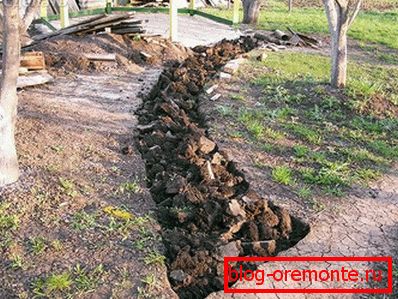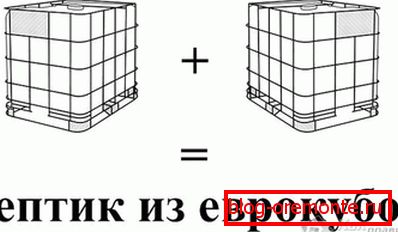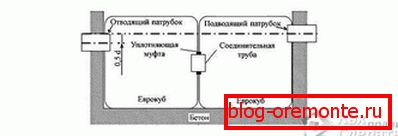Do-it-yourself eurocube septic tank: installation
Sewerage in a private house has become a noticeable trend. For the device septic tank often used eurocubes. In this article we will consider the installation methods of such septic tanks.

Eurocube is a cube-shaped container made of multilayer polyethylene. It is designed to store various liquids. Its advantages over a septic tank of concrete rings or a dug drain pit are as follows:
- no unpleasant smell;
- the ability to organize the system yourself;
- quick septic tank cleaning;
- long service life.
When designing a future structure, it is necessary to determine the size of the plastic container. It depends on how many tenants live in a private house.
You can estimate the cost of water per person per day, multiplying them by the number of tenants. The size of the septic tank should be 2-3 times larger than the obtained value.
For example, if the final value is 1700 liters of water, then two containers of 1 thousand liters each will be required.

It is necessary to have a septic tank not less than 30-40 meters from the well.
Also, it should not be too far from the basement of the house. The ideal option would be its placement in 5 meters from the building. For the flow of wastewater into the septic tank, it is necessary to observe the correct pipe slope. And if the distance from the house is too large, it will force the Eurocup to be placed in the ground even deeper than originally intended.
For the organization of a complete cleaning system requires the creation of a drainage area. There will be sent water from the Euro Cup after processing. To do this, prepare a trench with a length of several meters, diverging from the outlet. A sand and gravel cushion is prepared in the pit, perforated pipes are laid, and the top is covered with rubble, geotextile and soil. Read more about creating a filter field here.
The plastic of which Eurocubes are made is quite light, it can undergo deformation due to seasonal heaving of the soil. To avoid such problems, it is required to concrete the bottom of the hole in the ground.
The width and depth of the trench should be equal to the size of the Eurocup + 15 - 20 cm on each side. From the house to the installation site, trenches should be prepared for the drain pipes with a slight slope. Ditches should be provided with a pad of sand and gravel to reduce the possibility of pipe deformation. Learn more about the technology of laying pipes and installing septic tanks here.
Stages of manufacturing and installation

- First you need to carefully calculate the volume of containers that will be installed.
- Preparation of trenches for Eurocubes includes not only digging to the required depth, but also pre-concreting the bottom of the holes with the creation of a sand-gravel pad for drainage pipes.
- If the septic tank contains more than 1 container, you need to prepare the connecting pipe and seal it properly with silicone or sealant. The second auxiliary eurocube should always be installed 20-30 cm below the first. The opening for the connecting pipe in the first euro cup should be 20-30 cm below the inlet for the drain pipes.
- When assembling, it is necessary to organize ventilation openings and openings for future cleaning in each used container. To do this, a hole is cut in the upper part of the cube, into which a pipe with a diameter of about 5 cm is inserted.
- Before installing containers, leading pipes and sealing them, it is necessary to reinforce the resulting structure. For this, metal frames for Eurocubes are used. They are welded together and lowered into the prepared pit. A concrete mix is poured into a space of 10–20 cm wide left on the sides.
- However, such a structure is not considered complete without diversion of recycled waste to a dedicated drainage field. If there is no possibility to divert excess waste, then bioactivators should be used for the fastest processing of the septic tank contents.
- After the containers have been mounted and strengthened, metal sheets or wooden shields are laid on top of the structure, which will prevent the likely ascent of plastic containers. Soil is compacted so that only the ventilation pipe is left free.

Plastic containers have thin walls; in order not to damage them, during the pouring of concrete, Eurocubes should be filled with water, and the process itself should be carried out as carefully as possible.
Cleaning
If ordinary sewage treatment plants require almost monthly pumping, for a septic tank made of plastic containers, cleaning may be required only once a year and even less frequently. This is due to the accumulation of unprocessed waste.
To clean such a structure, it will be necessary to free the ventilation pipe from the ground and make the process of cleaning the container through it.
Video: installation of a septic tank
Scheme



